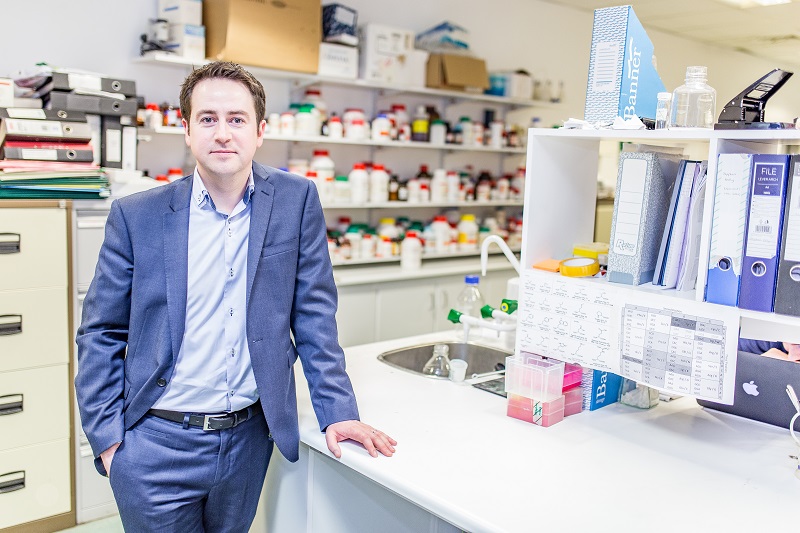
PROFESSOR BRENDAN GILMORE
PUSHING BIODISCOVERY BOUNDARIES IN THE BATTLE AGAINST BIOFILM
Professor Brendan Gilmore’s primary research interests have been in the role played by proteolytic enzymes (proteases) in the progression of diseases. However, following appointment to Queen’s University Belfast and a sabbatical visit to Prof Howard Ceri’s Biofilm Research Group at the University of Calgary, his research focus shifted to understanding and controlling the process of biofilm formation. Biofilms are fascinatingly complex communities of bacteria, attached to surfaces and embedded within a matrix of self-produced extracellular polymeric material, often referred to as slime. Bacteria within these communities converse and cooperate through a process known as Quorum Sensing.
These bacterial cities represent the predominant mode of growth of bacteria in both the natural environment and during chronic infections. Importantly, when bacteria form biofilms (as they do in between 60-80% of chronic, persisting or recurring bacterial infections) they become exceptionally difficult to treat, since they resist normal immune clearance mechanisms and exhibit elevated tolerance to antibiotics – often requiring up to 1000-fold more antibiotic to kill compared to bacteria living in suspension.
Therefore, research in Brendan’s group aims to tackle the problem of biofilms in two main ways (i) development of efficient methods to control or eradicate biofilms and (ii) discovery of new antibiotic or quorum sensing inhibitor compounds capable of either destroying biofilms or increasing their sensitivity to conventional antibiotics. The former work has led Brendan to research the application of non-thermal ‘cold’ 19 RESEARCH PARTNERS plasmas for biofilm eradication. Non-thermal plasmas are gases, which are partially ionized under the influence of an electric field, giving rise to a powerful cocktail of reactive oxygen and nitrogen species, capable of rapidly destroying bacteria. This successful, multidisciplinary work is currently in the early stages of the commercialization process and Brendan’s hope is that this technology can be used to treat patients with chronic topical infections, as well as hospital and other surfaces which act as a reservoir of infectious agents. Discovery of new antibiotic and anti-infective agents has become one of the most pressing issues in healthcare in the face of burgeoning antibiotic resistance.
Brendan’s group are involved in a major biodiscovery programme, where they are discovering new antimicrobial agents from ancient bacteria and archaea isolated from a salt mine in Northern Ireland. These halophiles are not only being mined for antibiotic discovery, but also for the discovery of novel enzymes for use in the pharmaceutical industry. Finally, Bacteria growing in biofilms utilize proteases for regulation of the biofilm matrix and interactions with the host and are a key target therefore for the design of highly specific protease inhibitors which are capable of modulating the process of biofilm formation.
In our previous work we have shown that targeting a specific protease from Pseudomonas aeruginosa, lasB, not only reduced the amount of extracellular matrix (slime) produced by the biofilm, but resensitized the bacteria within to conventional antibiotics, reducing the amount of antibiotic required to destroy the biofilm. Brendan’s group are using specific protease inhibitors to tease apart the regulatory mechanisms that control biofilm formation, in the search for new drug targets. Brendan’s world leading research on biofilm control was recognized by the award of the 2013 Royal Pharmaceutical Society Science Award for his contributions to the field. He has authored over 100 peer reviewed publications and patents, an the pre-eminent text book Hugo & Russell’s Pharmaceutical Microbiology (8th Ed), a core text in Schools of Pharmacy worldwide.
Research partners:
- Biotechnology and Biological Sciences Research Council
- Engineering and Physical Sciences Research Council
- Invest Northern Ireland
- Beaufort Marine Biodiscovery
- Society for Applied Microbiology


